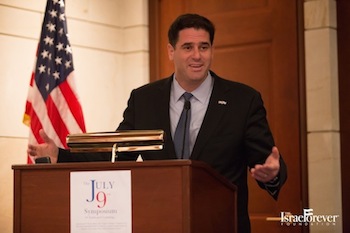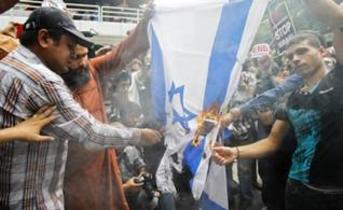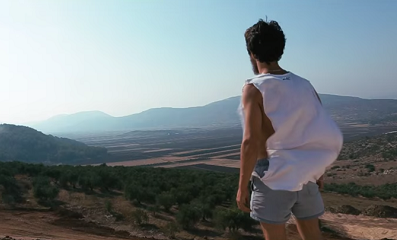Israel: A Congenital Act of Aggression?
Sep 12, 2014
As rockets rained into Israel on the third day of the current Israel-Hamas conflict, the irony of the situation was not lost: Capitol Hill held a symposium on July 9, 2014, the tenth anniversary of the International Court of Justice (ICJ) advisory opinion denouncing the legality and necessity of Israel’s national security fence. The event was organized by Richard Heideman, Chief Counsel for American Victims of Terrorism, author of the Hague Odyssey and cofounder of the Israel Foundation. The high-profile speakers all spoke ardently in opposition to the ICJ’s opinion. No doubt, the unforeseen war currently in progress demonstrated the legitimacy of Israel’s security fence and the folly of the ICJ’s assertion to the contrary.

The ICJ
The ICJ is the principal judicial organ of the UN, seated in The Hague, and established in 1945 by the UN Charter. It has the jurisdiction to settle legal disputes submitted by States when the parties agree to the Court’s jurisdiction. It also has the authority to issue advisory opinions on legal questions submitted by authorized UN bodies and specialized agencies. It consists of 15 judges elected by the UN General Assembly (GA) and the UN Security Council, each to serve out a term of 9 years.
Background
After the Palestinian Authority was unable to successfully pass its proposed resolution in the Security Council, it initiated a resolution in the UN GA, which regularly passes anti-Israel resolutions.
Thus, on December 8, 2003, the GA passed the resolution (in a special emergency session) to send the ICJ a question requesting an advisory opinion. The question read, “[W]hat are the legal consequences of the construction of the wall being built by Israel, the Occupying Power, in the Occupied Palestinian Territory?”
Numerous other countries filed briefs with the ICJ, primarily asserting the Court’s lack of jurisdiction to entertain the question. First, the PA is not a state so it cannot submit a dispute for settlement. Second, Israel never agreed to accept the ICJ’s jurisdiction on this matter. Third, per prior legal agreements between Israel and Palestine, conflicts should be resolved through bi-lateral negotiations, not through a court. Fourth, the issue is really a political matter, not a legal matter. But even if the GA does have standing to request an advisory opinion, the court’s opinion does not constitute binding law.
None of this stopped the ICJ from rendering its opinion, however, which wholeheartedly accepted the Palestinian position and rejected entirely Israel’s argument that the wall was needed for security purposes.
The ICJ issued a press release explaining that “the Court finds the construction of the wall being built by Israel’s Occupying Power, in the Occupied Palestinian Territory, including in and around East Jerusalem and its associated regime, are contrary to international law.” It further stated that Israel has an obligation to cease construction of the wall, dismantle what has been erected, and make “reparations for all damage caused by the wall.”
The Court dismissed Israel’s argument that the wall was necessary to achieve its security objectives and that it was justified self-defense. Further, the ICJ suggested that the UN, and the GA in particular, “consider what further action is required to bring an end to the illegal situation…”
This opinion came one week subsequent to, and in disregard of, the Israeli Supreme Court’s ruling, ordering a section of the barrier outside Jerusalem to be re-routed to accommodate Palestinians and reduce the hardship they were experiencing as a result of the fence’s location, demonstrating Israel’s humanitarian values.

The Symposium
In his opening remarks, Richard Heideman noted that the fence has indisputably saved lives and is legitimate and necessary. He also pointed out that all countries have an obligation to defend their citizens and that the wall was erected for security reasons alone, that it is not an apartheid wall as some claim. Finally, he questioned the legality of the ICJ’s advisory opinion.
Israeli Ambassador Ron Dermer explained what readers will not hear in the mainstream media: that ¾ of Israel’s population is threatened by Hamas rockets, that many have had to relocate, and that those who remain in their homes in the shelled areas are hearing alarms to run to shelters numerous times a day and throughout the night.
He emphasized that there is no moral equivalency between Israel and Hamas. Hamas is a terror organization which uses children as human shields, celebrates the deaths of Israelis and uses the deaths of Palestinians as PR fodder, while Israel considers the loss of any innocent life to be a tragedy.
He pointed out the double standard to which Israel is held: no other country in the world is held to the standard of perfection to which Israel is held. And, the only reason that hundreds of innocent Israelis have not died in this war is not for Hamas’ lack of effort, but due to Israel’s iron dome missile defense program.
Ambassador Dermer referred to Netanyahu’s concept of “the reversal of causality” where the press confuses cause with effect. It is false that the “occupied territory” is the cause of Palestinian hostility, when in fact it is their hostility that caused the need for the wall. Indeed, the PLO was fighting Israel three years prior to any so-called “occupation”, not to mention that the “occupied” land was acquired in response to a war started by hostile Arab states who want to see Israel obliterated.
The Palestinians would have had their own state by now, but for the fact that in 1947 Arab leaders rejected a two state resolution at the UN.
The Ambassador aptly pointed out that it was the stance of the Arabs which created the Palestinian refugee problem, and the wall was a response only to waves of terror. Palestinians are attempting to turn the wall into a grievance and falsely claim it is the cause of their hostility, when in fact it was the result.
Professor Irwin Cotler, former Minister of Justice and Attorney General of Canada, Member of the Canadian Parliament, and human rights attorney, discussed “masking the delegitimization of Israel by cover of rule of law.” He argued that delegitimization is a buzz word to attack Israel’s right to exist and to defend herself. In order to avoid criticism for delegitimization, many are masking this goal with the pre-textual language of law, human rights and combatting genocide.
Though the conflict is political in nature, using legal or human rights language makes the Palestinian position seem more credible. The masking of delegitimization began with a UN resolution that asserted “Zionism is racism”, thus giving the appearance of international law to a politically motivated anti-Israel bias. Indeed, UN resolutions regularly make assertions without evidence and then these resolutions are used as evidence that Israel is violating human rights law. Still, the UN turns a blind eye to real human rights abusers.
Cotler noted that delegitimization is not new, but existed from the creation of Israel. Israel’s “original sin” was her establishment, and her mere existence was referred to as “a congenital act of aggression.”
Ken Marcus, President of the Louis D. Brandeis Center and former Staff Director for the US Commission on Civil Rights, discussed the proliferation of anti-Israel sentiment rampant on US college campuses. He argued that college campuses are no longer oases of tolerance as they once were. When universities are informed of discrimination, they address it promptly unless the discrimination is against those who are pro-Israel. Marcus refers to it as “the Israel exception.”
Marcus provided real life examples of college student who were called names such as “kike” or “dirty Jew.” Some were spit on or assaulted for wearing Jewish stars or supporting Israel. In California, one female student was trampled for holding up a sign that read, “Israel wants peace.” Yet, universities do nothing to provide protection in these circumstances. Instead, they proclaim that such hatred is “political expression” or “free expression.”
Additionally, Marcus pointed out that anti-Semitic discrimination was not considered discrimination against ethnicity by the US Commission on Civil Rights until ten years ago. Never-the-less, getting the Commission to enforce this policy is another matter, as to date the office insists that it has found not one instant of anti-Semitic discrimination despite the complaints that have been filed.
Colleges profess to value diversity, but as Marcus pointed out, that diversity does not include diversity of opinion when the subject is Israel.
Sarah Stern, President of Endowment for Middle East Truth, gave a moving speech in which she told the story of her aunt in Poland, who was ordered to strip naked and stand by the edge of a ditch. She and her twin baby girls were then gunned to death. Others were similarly murdered. What was their crime? They were Jewish.
Stern explained that the old anti-Semitism against Jewish individuals is now levied against the collective Jewish State of Israel. The Oslo Accords, she noted, were predicated on the notion that the Jews would relinquish land in exchange for peace. Yet, when Israel pulled out of Gaza, what they received was not peace, but the firing of 10,000 Kassam rockets into Israel proper.
Arab nations, Stern explained, always refused to recognize the state of Israel. Hamas’ stance is no peace with Israel, no negotiations with Israel, and no recognition of Israel. College campuses and international organizations like the UN are replete with anti-Israel bigotry, despite the fact that Israel is one “tiny” state in the Middle East and the only state in the region that upholds values of freedom, human rights and equality. “Why is Israel so reviled?” Stern asked. “Because it is a Jewish State.”
There were other speakers at the symposium as well, all of whom passionately argued in favor of Israel’s terrorism prevention security fence and against the ICJ’s advisory opinion.
Conclusion
The coincident and subsequent events to the symposium, that constitute the Israel-Hamas war, could not have been foreseen at the time the symposium was scheduled. Yet, the current war in that region makes the points articulated by the symposium’s speakers crystal clear.
After weeks of unprompted Hamas rockets shooting into Israel, followed by the brutal murder of three Israeli teenagers in the West Bank, Israel finally responded with a campaign to destroy the tunnels built by Hamas to smuggle in weapons. Despite the fact that Israel is the only nation in the world that calls, texts, and drops warning leaflets prior to bombing, she is still condemned for acts that constitute self-defense. The “disproportionate” number of Palestinian deaths (approximately 1800, half of which are Hamas or other militants) to that of the Israeli deaths (approximately 68 IDF soldiers and three civilians) does not indicate the nature of the parties’ intent. Israel goes out of its way to avoid civilian casualties, targeting only Hamas militants, their weapon storage areas and tunnels. It mourns the death of every innocent Palestinian. And yet, it is Hamas who should be held responsible for the deaths of both Israelis and Palestinians because it purposely puts them in harm’s way.
One cannot have peace without a partner for peace. This war, like those that preceded it, are not about land or territory. It is an existential issue for the Jewish State of Israel, against those who want her extinction simply because she’s Jewish. Some naively believe that Palestinians only want Israel to evacuate the “occupied territory.” But the rallying cries call out, “[P]alestine shall be free, from the river to the sea.” That constitutes ALL of Israel. The schoolbooks disseminated by Palestinians that refer to all of Israel as Palestine, the cartoons that teach children hatred, and the celebrations by Palestinian mothers of their sons’ martyrdom all bely the claim that most Palestinians want peace with Israel.
Hamas’ repeated declinations or violations of all truce offers and ceasefire agreements to date, prove the point made by the July 9th symposium. The security fence IS necessary to meet Israel’s national security objectives and the ICJ was wrong to dismiss Israel’s arguments. Israel is the only nation in the world expected to adhere to a standard of utter passivity in the face of war.
Regardless of her commitment to freedom and humanitarianism, Israel will always be demonized. As Professor Cotler noted, Israel’s real crime is her mere existence, “a congenital act of aggression.”
Deborah Weiss, Esq. is a regular contributor to FrontPage Magazine and the Washington Times. She is a contributing author to “Saudi Arabia and the Global Islamic Terrorist Network” and the primary writer and researcher for “Council on American Islamic Relations: Its Use of Lawfare and Intimidation.” You can find more of her articles on www.vigilancenow.org
To read the original article, click here
Read the full article here.






